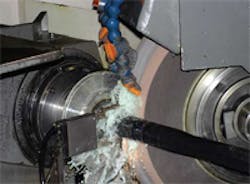When John Aldrich was brought in to turn around Machine Tool & Gear Inc., the shop, entirely dependant on the automotive industry, was amassing losses to the tune of $3 million.
Aldrich is the group general manager for Newcor Machined Products Group, a company that, in 1997, acquired Machine Tool & Gear, which had been family owned since 1927.
“It was a disaster. We had bodies in front of machines seven days a week, but most machines weren’t running five days a week,” Aldrich said.
To turn the shop around, Aldrich involved the employees in identifying issues and setting priorities. The first priority became getting the plant clean and orderly. The second was preventative maintenance.
“Everything in manufacturing is about discipline. When you go into a plant that’s out of control, it doesn’t take formal training to use a broom and dustpan,” Aldrich said.
With improved housekeeping, employees grew more enthusiastic to tackle processimprovement projects. For example, a 14-machine cell that was doing axle shafts ran 168 hours a week (24/7) and still couldn’t meet schedules. Two years later and after process improvements, the cell was running 100 hours per week – two 10-hour shifts per day, five days a week – and meeting delivery dates.
Aldrich’s machinery strategy is fairly simple: Replace old with new or capable used equipment; embrace off-thefloor remanufacturing to bring machines to current standards; rebuild where it’s possible to return machines to original performance; identify and incorporate improvement modifications to every like machine on the floor; and throw away machines that can’t comply.
Although his number one principle is to replace old with new, Aldrich actually purchases very little new capital equipment in a turnaround. Instead, he focuses on repairs and rebuilds. In fact, Aldrich brought in a retired grinding machine service man to teach Machine Tool & Gear’s maintenance personnel how to rebuild the shop’s machines.
After several machines were rebuilt and returned to original condition, Aldrich reported spectacular improvement not only in plant performance, but also in the community.
“When you’re fixing a plant and productivity is improving, word gets out. Word on the street is that the company is a great place to work,” he said.
Two years after losing $3 million in 1999, Machine Tool & Gear showed a profit of $2 million, and went from having a product line that ran at 18 percent scrap to production scrap as a percentage of costs plant-wide that was less than 0.5 percent.
According to Aldrich and Dave Ochodnicky, plant manager at Machine Tool & Gear, benefits have extended beyond just talk. As a result of improvements, the company quoted and won a differential pinion-shaft job that a customer sourced from South Korea.
Along with improving his maintenance staff, Aldrich also called on OEMs to bolster the plant’s performance. He said that setup people are a shop’s first line of defense, maintenance technicians are second, and OEM relationships are third.
With that said, Aldrich had a Toyoda Machinery () service engineer from the company’s Automotive Products Division in Wixom, Mich., come in and assess Machine Tool & Gear’s line of grinders.
“He looked at all our machines and gave us his review of replacing components and rebuilding machines,” Aldrich said.
“As good as your maintenance people are, it pays to call in the OEM. Our product is our machinery’s capability, uptime and throughput. If an OEM’s advice and response isn’t helpful, it makes it that much harder to be a buyer when conditions warrant,” he added.
In 2005, when Machine Tool & Gear won a large contract, it returned to Toyoda for new grinders.
“This doesn’t take place in a vacuum,” Aldrich said of OEM relationships.
“It takes long-term commitment not only to developing and improving new equipment, but also to rebuilding and remanufacturing a customer’s existing machines.”
